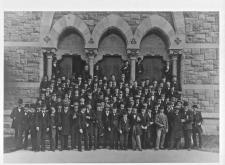Human Experimentation: Rethinking The 'Bad Old Days'
By Barron Lerner,
Forbes
| 04. 19. 2016
Untitled Document
Princeton University’s decision to keep Woodrow Wilson’s name on a series of buildings and programs is the latest development in the recent debates over controversial historical figures. While this topic has focused primarily on Wilson, Thomas Jefferson, John C. Calhoun and other politicians who espoused racist beliefs, there is a parallel debate in the world of bioethics.
In this week’s Annals of Internal Medicine, Arthur Caplan and I look back at a series of odious experiments done by medical researchers on disadvantaged populations. Although these investigators have rightly been excoriated for their actions, we argue that it is crucial to ask why these individuals—sometimes very progressive in their thinking—nevertheless behaved so badly when it came to medical research.
What are the kind of experiments that require more than condemnation? One occurred at Brooklyn’s Jewish Chronic Disease Hospital in 1963, when Memorial Sloan Kettering physician Chester Southam injected cancer cells without informed consent into debilitated non-cancer patients. When the media found out about the experiments, a scandal erupted. Southam is routinely listed in the pantheon of unethical...
Related Articles
Alice Wong, founder of the Disability Visibility Project, MacArthur Genius, liberationist, storyteller, writer, and friend of CGS, died on November 14. Alice shone a bright light on pervasive ableism in our society. She articulated how people with disabilities are limited not by an inability to do things but by systemic segregation and discrimination, the de-prioritization of accessibility, and the devaluation of their lives.
We at CGS learned so much from Alice about disability justice, which goes beyond rights...
By Gregory Laub and Hannah Glaser, MedPage Today | 08.07.2025
In this MedPage Today interview, Leigh Turner, PhD, a professor of health policy and bioethics at the University of California Irvine, unpacks the growing influence of stem cell clinics and the blurred line between medicine and marketing. He explains how...
By Russ Burlingame, Comicbook | 07.23.2024
Colossal Laboratories and Biosciences, a biotech company that's putting together plans to orchestrate the de-extinction for animals like the dodo and the wooly mammoth, made some waves on Reddit recently when they petitioned the United Federation of Planets -- the...
By Miri (Margaret) Raven, Alana Gall, Bibi Barba, and Daniel Robinson, The Conversation | 06.02.2024
Image by Ahmet Kurt from Unsplash
Last week, at a conference in Geneva, the member states of the World Intellectual Property Organisation agreed on a new treaty aimed at preventing the for-profit piracy of traditional knowledge.
So-called “biopiracy”, in...




